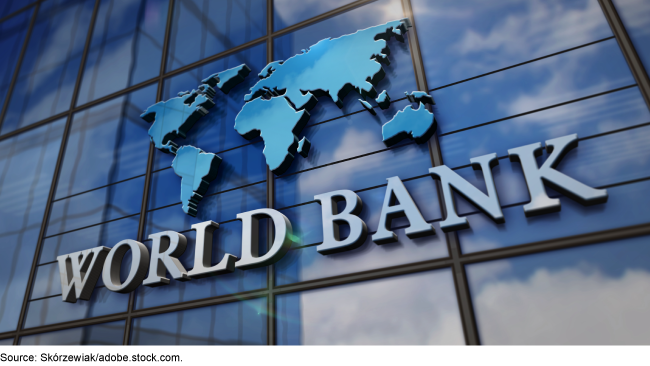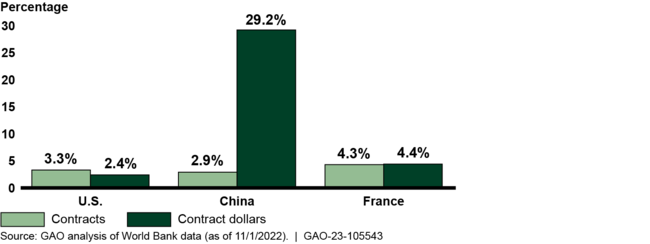World Bank: Borrower Countries' Contracts to Businesses in the U.S. and to Entities Potentially on U.S. Sanctions or Other Lists of Concern
Fast Facts
The World Bank provides financing to low and middle-income countries for things like infrastructure, social, and economic development projects.
Countries use World Bank money to award contracts to businesses for the projects. Countries award an annual average of about $15 billion, and U.S. businesses got about 1% of these funds. In the past 6 years, when U.S. businesses bid, they won their bids about 70% of the time.
The World Bank doesn't disqualify businesses that are on U.S. sanctions or watch lists and World Bank confirmed that at least a small fraction of contracts were awarded to businesses on those lists in 2017-2021.

Highlights
What GAO Found
World Bank data indicate that businesses in the U.S. were awarded a relatively small share of contract dollars, but were often successful when bidding. According to World Bank data, from World Bank fiscal years (FY) 2013 through 2022, borrower countries awarded on average around 21,000 contracts valued at $15 billion per year to domestic and international businesses. Of those contracts awarded to international businesses, businesses in the U.S. were awarded the second-highest number of contracts (about 3 percent), but the ninth-highest contract dollars (about 2 percent). Businesses in China were awarded the third-highest number of international contracts (about 3 percent), but the most contract dollars (about 29 percent), as shown in the figure. Businesses in the U.S. bid on few contracts, but won about 70 percent of contracts when they bid, according to GAO's analysis of World Bank summary data from FY 2017 to October 2022.
Figure: Percentage of World Bank Borrower International Contract Awards to Businesses in the U.S., China, and France, Fiscal Years 2013-2022

Notes: The World Bank's fiscal year begins July 1st. The number and dollar amount of contracts awarded to businesses in the U.S. and other countries may be over or underestimated due to limitations in the World Bank's data. For example, borrowers identify contract awardees based on the country of business registration, which may not take into account beneficial ownership or other considerations that may affect determinations of nationality and ownership. The data also include contracts awarded to multilateral organizations such as the United Nations.
GAO's analysis found that from calendar years 2017 through 2021, World Bank borrowers awarded 28 contracts to entities that may have been on selected U.S. sanctions and other lists of parties of concern, such as export control lists. These 28 contracts—worth around $76 million—were out of approximately 150,000 contracts worth around $80 billion that GAO reviewed in its analysis covering the period. World Bank officials told us that all entities from all countries are eligible to bid for borrower contracts, except for certain entities debarred by the World Bank or sanctioned by the United Nations. Those officials also told us that the World Bank screens contract awardees against some U.S. sanctions lists and that it could confirm only six of the 28 contracts were awarded to entities on U.S. lists. Department of the Treasury (Treasury) officials told us that Treasury is not responsible for monitoring individual borrower contract awards, which occur after the World Bank board approves a project.
Why GAO Did This Study
The United States is one of the largest contributors to the World Bank. The World Bank provides financing to low- and middle-income countries for a number of purposes such as for infrastructure and social and economic development projects. World Bank borrowers are responsible for managing projects in line with the World Bank's policies. The World Bank requires borrowers to use competitive procurement processes to award contracts for project implementation. Treasury leads U.S. engagement with and has oversight responsibility for the World Bank, and Treasury officials are stationed in the Office of the U.S. Executive Director, which represents U.S. priorities and concerns on the World Bank's board.
GAO was asked to review World Bank borrowers' contract awards. This report examines (1) the extent to which World Bank borrowers awarded contracts to businesses in the U.S. in comparison to businesses in other countries; and (2) the extent to which World Bank borrowers awarded contracts to entities that may have been on selected U.S. sanctions or other lists of parties of concern, and what actions, if any, Treasury took in response.
GAO analyzed World Bank data on borrower contract awards from World Bank FYs 2013 through 2022. GAO compared contract awardees from calendar years 2017 through 2021 against individuals and entities on selected U.S. sanctions and other lists of parties of concern. GAO also performed detailed reviews of records identified as part of the analysis. GAO interviewed World Bank and U.S. agency officials to understand the availability and limitations of their data.
For more information, contact Latesha Love-Grayer at (202) 512-4409 or LoveGrayerL@gao.gov.
